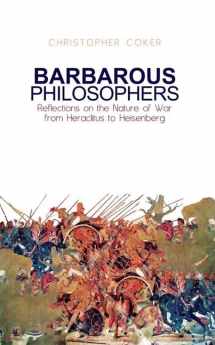
Barbarous Philosophers: Reflections on the Nature of War from Herclitus to Heisenberg
ISBN-13:
9780199327249
ISBN-10:
0199327246
Edition:
1
Author:
Christopher Coker
Publication date:
2010
Publisher:
Oxford University Press
Format:
Hardcover
288 pages
FREE US shipping
Book details
ISBN-13:
9780199327249
ISBN-10:
0199327246
Edition:
1
Author:
Christopher Coker
Publication date:
2010
Publisher:
Oxford University Press
Format:
Hardcover
288 pages
Summary
Barbarous Philosophers: Reflections on the Nature of War from Herclitus to Heisenberg (ISBN-13: 9780199327249 and ISBN-10: 0199327246), written by authors
Christopher Coker, was published by Oxford University Press in 2010.
With an overall rating of 3.8 stars, it's a notable title among other
books. You can easily purchase or rent Barbarous Philosophers: Reflections on the Nature of War from Herclitus to Heisenberg (Hardcover) from BooksRun,
along with many other new and used
books
and textbooks.
And, if you're looking to sell your copy, our current buyback offer is $0.3.
Description
This is not a book about philosophy and war. It is a book on contemporary conflict in which the author invokes philosophy to help understand the problems that we face in fighting war today. Barbarous Philosophers sets out to discuss the nature of war through the work of sixteen philosophers from Heraclitus in the sixth century BC to the philosopher-physicist Werner Heisenberg writing in the 1950s. Each section begins with a brief epigram representative of each writer's thinking. The contention of the book is that war, as opposed to warfare, is largely an invention of philosophy--our reflection on organised collective violence that date from the time we emerged from the hunter-gatherer stage of development and created the first civilisations centred around city life. The Greek philosophers were the first to invent what Pascal called the 'rules' of war and in representing the nature of war they also influenced how it was conducted to the extent that generals allowed their minds to be shaped over time by the work of philosophy. The purpose of philosophy, writes Herbert Simon, is to understand meaningful simplicity in the midst of disorderly complexity. Behind the flux of everyday life there is an 'ordered' existence which it is the task of philosophy to uncover if it can. Behind the ever changing character of war lies its nature that needs to be grasped if it is to be waged successfully.


We would LOVE it if you could help us and other readers by reviewing the book
Book review

Congratulations! We have received your book review.
{user}
{createdAt}
by {truncated_author}


